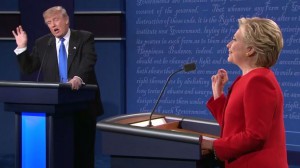Race and Climate Change in the First Presidential Debate

As a lobbyist, I hate election season. Campaigns show the worst side of politics: the fake folksiness, the reluctant baby-kissing, and the overstated promises that won’t be delivered on. The actual business of governing is much more interesting than the race itself because it relies on substance and requires mutual collaboration instead of mutual antagonization.
Still, last night’s presidential debate was a major milestone in the 2016 election, which means that countless lobbyists, myself included, and activists across the country paid close attention to what was being said.
While the beginning of the debate focused on economic issues such as taxes, trade, and job creation, the topic soon turned to an issue that humanists are extremely concerned about—racism in America.
This is an area where Democratic nominee Hillary Clinton really shined. While the Republican candidate Donald Trump relied on prejudice and outdated conservative tropes about the importance of enforcing “law and order,” Clinton attempted to really get into the nitty-gritty of why Black communities and their allies are asking for change. In response to a question about police bias against people of color, Clinton said, “I think implicit bias is a problem for everyone, not just police. I think, unfortunately, too many of us in our great country jump to conclusions about each other. And therefore, I think we need all of us to be asking hard questions about, you know, why am I feeling this way?”
This response speaks to racial discrimination while also hitting on a much bigger problem in American society—the distrust and dislike of those different from ourselves. This fear of the “other” has manifested itself at times in outright violence and other times in more subtle discriminatory behaviors against many marginalized communities, from communities of color to the LGBTQ community and to the nontheistic community.
Clinton’s remarks on this issue weren’t entirely perfect. After criticizing Trump for his extremely negative characterization of Black Americans, Clinton went on to list some of the positive things about Black communities in America, such as “the vibrancy of the Black church, the Black businesses that employ so many people, the opportunities that so many families are working to provide for their kids.”
By explicitly stating that one of the major positive achievements of aspects of the Black community in America was their religious activity, Clinton seemed to be stating that religious beliefs are a positive accomplishment, with the implication that the lack of such beliefs are a failure. This statement alienates the large number of Black Americans who don’t belong to a religious institution and don’t believe in a god, and it also continues a worrying trend in Clinton’s campaign that promotes religion to voters. For example, at a speech just a few weeks ago in front of the National Baptist Convention, Clinton said that Americans need “a president who will pray with you and for you.”
In addition to racism, another issue that concerns humanists is climate change, specifically the campaign by the religious right and their allies to discredit the sound science underpinning warnings about the future impacts of this crisis. Clinton spoke for several minutes about her clean energy initiatives, capping off her proposals with a pointed, “I believe in science,” and declaring to voters that “Donald thinks that climate change is a hoax perpetrated by the Chinese.” While Trump denied this charge, numerous fact-checkers have shown that he did in fact make such a remark on his Twitter account.
If Trump truly admits that climate change is at least partially the result of human activity, humanists should rejoice. To actually have two candidates that acknowledge the reality of our devastating climate situation is certainly positive, even if one of the candidates took a while to come around. After all, what should matter most to humanists aren’t the initial views of the candidates, but their views now that they have further considered the issues and received new information. Clinton wasn’t initially supportive of marriage equality but now is a strong defender of LGBTQ rights. So if Trump really has accepted the science behind climate change, he should be commended for doing so and questioned further about his plans for dealing with this important issue.
The first presidential debate was far too short to cover every issue (and the timid moderation by Lester Holt precluded the candidates from focusing on more issues), but Americans should have gotten a good feel for the candidates and what drives them. Hopefully, future debates will allow for the candidates to promote messages of inclusion and equality for all, regardless of race, religion, sexual orientation, or gender identity.
